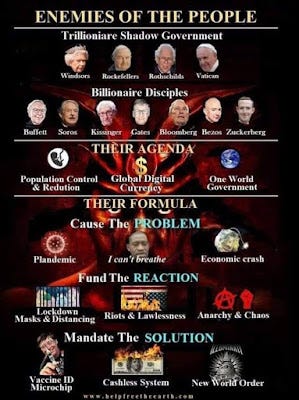Dealing With Conspiracy Theorists

I'm surrounded by conspiracy theorists. Literally. Within several hundred feet of my house, in several directions, are vocal conspiracy theorists.
Originally, it was simply funny. When one of them was trying to convince me that diet soda was part of Obama's plan to test toxins, and that you can play people's speech backwards to discern their true intent, and that Michelle Obama is actually a man, it was just pathetically hilarious.
Now, of course, it's much more sinister. Because now it's all about how Covid-19 is a hoax, and there is no reason to take precautions, and the vaccine is a plan by the Evil Not-So-Secret Powermongers to make lots of money while simultaneously reducing the world population.
Today I was forwarded a video on this theme, with the following text appearing at the top of the video: "Bill Gates and Dr. Fauci are paying trillions of dollars to Big Tech to stop this video going viral!" It is just astonishing that people believe this stuff unquestioningly. Trillions of dollars? Really? Gates only has about 100 billion. And he's spending twenty times that amount to suppress harmful videos? And Dr. Fauci, a career physician his entire life, suddenly has trillions of dollars to spend on protecting his secret interests? And out of all the conspiracy material out there, it's this one short stupid video that they are spending all this money to suppress? But it's so appealing for people to think that they're getting to watch something that someone powerful tried to suppress, that it blinds them to questioning whether this, or any of the claims made in the video, are actually true.
Is there any point in arguing with conspiracy theorists? Not really. But it's important for everyone to be aware of the flaws in conspiracy thinking, to prevent them from recruiting more to their ranks. The basic logical flaw in all conspiracy thinking is that it negates Occam's Razor. Conspiracy theories look for the most complicated explanation of events instead of the simplest explanations. But the reality is that most events can be very simply explained by ordinary causes, whereas conspiracies require levels of organization and cooperation which human beings are just not very good at.
And there are all kinds of psychological mechanisms which make conspiracy theories appeal to people. As noted above, it's appealing to think that you have access to "suppressed" or "secret" information. And it can actually be psychologically reassuring to believe that events, including harmful events, are not random or unplanned, but are the calculated result of a plan - even if it being planned by evil forces. And in the modern world of social media and email, it's very easy for people thus inclined to hook up with many other such people to reinforce their attitude.
If nothing else works, perhaps we can point out to people how conspiracy theorists usually flirt with a whole range of conspiracy theories - and many of these involve antisemitism.


